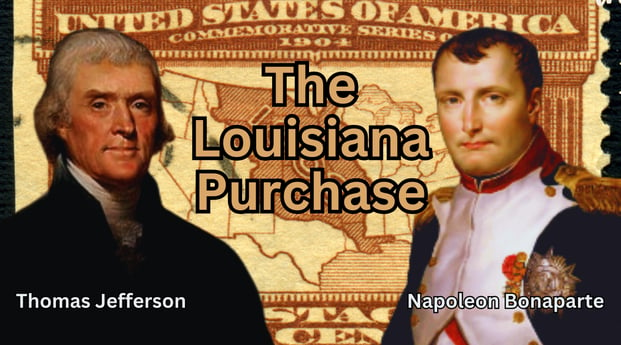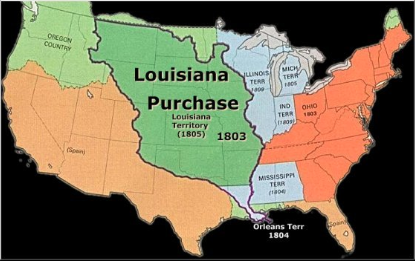"The Louisiana Purchase: Jefferson's Bold Expansion and the Doubling of a Nation"
The Louisiana Purchase stands as a landmark moment in American history, marking a strategic and transformative acquisition of territory that would shape the nation's destiny. Orchestrated by President Thomas Jefferson in 1803, this historic real estate deal doubled the size of the United States, opening vast new frontiers and setting the stage for westward expansion.
Casey Adams
11/10/20234 min read


Historical Context
French and Spanish Control of Louisiana
The Louisiana Territory had a complex history of European ownership.
Originally claimed by France in 1682, the territory was named in honor of King Louis XIV.
France ceded Louisiana to Spain in 1762 as part of the Treaty of Fontainebleau during the Seven Years' War.
Spain controlled the region for nearly four decades, but their management of the territory was limited, and the Spanish presence was largely confined to a few settlements and trade networks.
In 1800, under the Treaty of San Ildefonso, Napoleon Bonaparte regained the Louisiana Territory for France.
His goal was to rebuild a French colonial empire in the Americas, with Louisiana serving as a strategic base for this endeavor.
However, the French colony of Saint-Domingue (present-day Haiti) was undergoing a massive slave revolt, which culminated in the establishment of the independent nation of Haiti in 1804.
Napoleon's failure to suppress this rebellion, combined with the looming threat of war with Britain, forced him to reconsider his ambitions in the Americas.
The Role of New Orleans and the Mississippi River
The Mississippi River and the port of New Orleans were vital for trade and commerce in the early United States.
Farmers and merchants in the western territories relied heavily on the river to transport goods to international markets.
When Spain revoked American access to New Orleans in 1802, economic tensions mounted, and President Thomas Jefferson saw the acquisition of the port as critical to securing U.S. trade interests.
Negotiations and the Purchase
Jefferson sent envoys Robert R. Livingston and James Monroe to negotiate the purchase of New Orleans and its surrounding areas.
To their surprise, Napoleon offered to sell the entire Louisiana Territory.
His decision was motivated by practical concerns:
France's inability to defend the territory, the loss of Saint-Domingue, and the pressing need for funds to finance his military campaigns in Europe.
On April 30, 1803, the two sides finalized the agreement. For $15 million, the United States gained ownership of the Louisiana Territory.
The purchase added immense wealth to the U.S. in terms of land and resources, making it one of the most advantageous real estate deals in history.
Impact of the Louisiana Purchase
Expansion of U.S. Territory
The Louisiana Purchase nearly doubled the size of the United States, extending its sovereignty across the Mississippi River.
The newly acquired land encompassed parts of 15 present-day U.S. states and two Canadian provinces, including Arkansas, Missouri, Iowa, Oklahoma, Kansas, and Nebraska.
The territory also included portions of North and South Dakota, Montana, Wyoming, Colorado, Minnesota, New Mexico, Texas, and Louisiana, along with small areas in Alberta and Saskatchewan.
Population and Governance
At the time of the purchase, the non-native population in the Louisiana Territory was approximately 60,000, half of whom were enslaved Africans.
Governing this vast and diverse region posed significant challenges.
Jefferson, a strict constitutionalist, faced criticism from the Federalist Party for what they saw as an overreach of executive power.
However, Jefferson justified the purchase as a treaty negotiation, which was within the president's constitutional authority.
Economic and Strategic Benefits
The Louisiana Territory was rich in natural resources, fertile lands, and strategic geographic features.
Control of the Mississippi River and the port of New Orleans ensured American dominance over critical trade routes, fostering economic growth and westward migration.
Native American Displacement
While the Louisiana Purchase is celebrated as a milestone in U.S. history, it also marked the beginning of a new era of Native American displacement.
The acquisition granted the U.S. government the preemptive right to acquire Native lands, setting the stage for decades of conflict, treaties, and forced removals.
Defining Borders
The exact boundaries of the Louisiana Territory were not clearly defined at the time of purchase. Diplomatic efforts in subsequent years helped settle disputes.
The Adams-Onís Treaty of 1819 with Spain established the western border, while the Treaty of 1818 with Britain adjusted the northern border.
Legacy of the Louisiana Purchase
The Louisiana Purchase remains a defining moment in American history.
It embodied the vision of westward expansion and reinforced the United States' role as a growing power on the global stage.
For Thomas Jefferson, it fulfilled his ambition of creating a nation of independent farmers and securing the young republic's economic future.
However, the acquisition also highlighted contradictions in American ideals.
While Jefferson and other leaders championed liberty and expansion, the purchase further entrenched the institution of slavery in the southern states and set in motion policies that would displace and marginalize Native American populations.
Conclusion
The Louisiana Purchase was more than a land acquisition; it was a transformative event that shaped the trajectory of the United States.
By doubling the nation's size and securing critical trade routes, it fueled economic growth, facilitated westward expansion, and cemented the legacy of Thomas Jefferson's presidency.
Yet, it also laid bare the challenges and conflicts that would define America's expansionist policies in the 19th century.
Today, the Louisiana Purchase is remembered as a pivotal chapter in the story of the United States, exemplifying both the promise and the complexities of a growing nation.
References:
Kukla, Jon. "A Wilderness So Immense: The Louisiana Purchase and the Destiny of America." Vintage, 2004.
Ambrose, Stephen E. "Undaunted Courage: Meriwether Lewis, Thomas Jefferson, and the Opening of the American West." Simon & Schuster, 1996.
U.S. Department of State. "The Louisiana Purchase."



